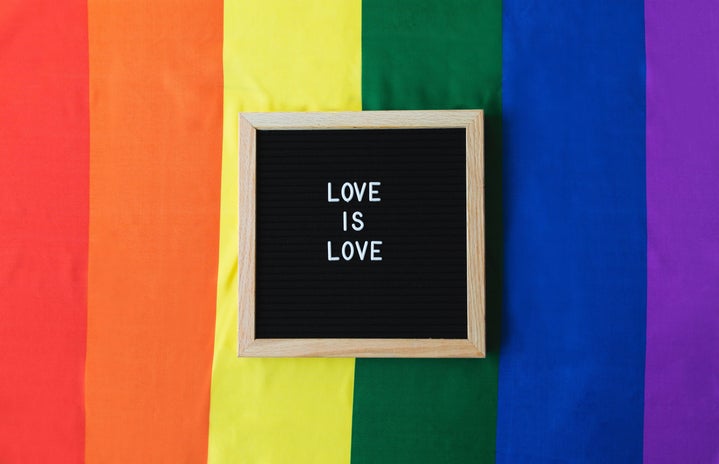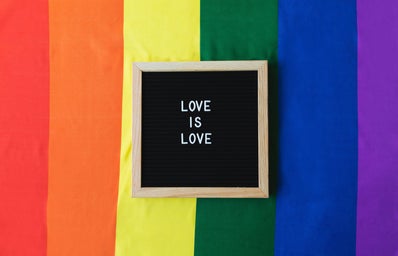Figuring out your sexuality as a member of the LGBTQ+ community is simultaneously one of the most emotional but validating experiences a queer person can have. It’s difficult trying to figure out your sexuality because it’s so deeply personal. There are so many sexualities to educate yourself about and it can be overwhelming trying to place yourself within the community. Not to mention the people in your life who might not understand or accept you. It can be a very difficult process, with much anxiety and uncertainty. But at the same time, finding a label for yourself can feel so validating and can help you understand yourself. It’s also wonderful to be able to situate yourself within a wider community that experiences life in a similar way to you, providing you with a sense of community where you fit in.
Personally, I have identified as being asexual for seven years now. I was so relieved when I found a label that I felt really defined me and my experiences. It was reassuring to know that there wasn’t something wrong with me for not conforming to heteronormativity and that other people understood what I was going through. The community really helped me come to terms with myself and helped me find my voice and defend myself and my identity. Heck, I’ve even written articles about my experience of being asexual (check them out if you wish, wink wink), so evidently, it’s been rather pivotal in my experience of life thus far. But now I find myself in a place where the asexual label just…doesn’t quite feel right anymore. And to be honest, I feel like I’m having a COMPLETE identity crisis because of it. It’s been such a big part of my self-understanding for such a long time. I’m not sure how to define myself without it. But even though it’s been challenging, it’s been necessary for me to rethink my identity and come to terms with who I am today.
But I’m not alone in my dilemma! It’s not uncommon for queer folks to change their sexual (or gender) identities throughout their lives. Even so, there is a lot of taboo on the subject and many queer friends I’ve chatted to have even called it “embarrassing” or “shameful” to redefine themselves. Many queer people even resort to closeting their new identities to avoid having to deal with the pressures and potential consequences of coming out again. I want to raise awareness on the topic because I don’t want there to be any associated shame with changing your identity! So, without further ado, let’s try to destigmatise the issue and get super personal in the process.
Imposter syndrome and guilt
Imposter syndrome seems to be a common theme amongst queers who are re-questioning their identities. Accepting your LGBT+ identity can be a very emotional journey, and often people can become overwhelmed with feelings of self-doubt, or feeling like they are “undeserving of identifying as part of the LGBTQ+ community”. This is often experienced because they’ve lived their life identifying one way for so long that it doesn’t feel natural to suddenly identify in a different way, despite feeling more at home in that label. A friend whom I chatted to about the subject said that their imposter syndrome was rooted in the fact that they now identify as lesbian after situating themselves within the bisexual community for so long. They felt like they were only serving to contribute to the negative stigma around bisexuality: that bisexuality is an intermediary label for people who aren’t ready to come out as gay.
This negative stigma is incredibly harmful to the bisexual community, as it invalidates those who are bisexual – experiencing attraction to more than one gender. The stigma also serves to contribute to biphobia, which is a prominent issue within the LGBT+ community. With an experience like my friend has had, it can be easy to feel guilty about this change in sexuality. But just know, if you are experiencing a similar situation, you aren’t contributing to biphobia! Just because you no longer feel comfortable with that label doesn’t mean that sexuality doesn’t exist, and you aren’t invalidating anyone by being true to yourself. And so long as you know that, and you recognise that you aren’t trying to perpetuate your experiences onto other people, you aren’t causing any harm. My friend even adds that it was necessary to come to terms with their sexuality, despite their anxieties of causing harm, and knows ultimately, they have done nothing wrong in just being themselves.
Personally, I have had a very similar experience. As mentioned before, for most of my adolescent years, I have identified as asexual and took great pride in the label. But now I feel like the label doesn’t quite fit me, and I’m feeling a lot of guilt surrounding that. Like with bisexuality, there are a lot of negative stigmas that surround asexuality as well. I’ve received a lot of comments throughout the years such as “You just haven’t met the right person yet” or “You’re too young to know that about yourself”, and the classic “It’s just a phase” and those questions always made me so angry. They’re so patronising and they just serve to invalidate asexuality as an identity. But now I feel so hypocritical having changed my mind! I have genuinely never had such a crisis in my life – I couldn’t help but see myself as part of the problem in allowing this stigma around asexuality to persist. Was this really just a phase? Were these people actually justified in their invalidation of me?
Just a phase?
But you know what? Maybe it was just a “phase” for me, but that doesn’t matter. Asexuality in and of itself is not a phase, it is a valid and very real sexuality that people identify with. Not every asexual person is going to change their sexuality, and that is what is important to remember. And the same goes for bisexuality, and any sexuality or gender identity for that matter. It’s okay to feel guilty or embarrassed about changing labels, but that shouldn’t serve as ‘proof’ to any homophobes who try to invalidate people’s identities off the premise of “it’s just a phase”. In fact, let’s just refrain from invalidating people and their identities, shall we? I think it would eradicate a lot of the guilt and self-doubt that we questioning-queers feel a lot of the time… I refuse to contribute to the homophobic connotations of the “just a phase” narrative.
Here’s the bottom line: What matters is that I found a label to identify with that helped me come to terms with myself and allowed me to determine what I desired and what I didn’t. Identifying as asexual also helped me feel okay with not being heteronormative and granted me the comfort of being in a community that understood my differences and accepted me. Just because I’m no longer asexual doesn’t mean that I was ever lying about my identity, it just means that I’ve changed and that I’ve learnt more about myself. But I still know that asexuality is completely valid, and my changing of identity does not discredit that. And be warned, I will fight anyone who tries to argue with me on that – I will defend aces with my life!
To wrap this up…
It’s important to remember that sexuality is fluid. It’s okay to have one label fit you at one part of your life and then identify with a completely different label at a later point. It’s like shoe size, in a way. You can’t expect one size shoe to fit you your entire life because you’re still growing. Likewise, you can’t expect your identity to remain rigid your whole life, and your desires and feelings can be subject to change.
This doesn’t mean that you were ever ‘wrong’ about the identity that fitted you at the time. You were just still growing, that’s all. It’s completely okay to change your identity label after some soul searching and experiencing more of life – it doesn’t mean that you were ever a fraud for identifying as something you no longer feel applies to you. And it doesn’t mean that your identity as it stands is for sure going to change – not everyone experiences this, and your identity is still valid.
If you’re experiencing something similar in figuring out your sexual identity, know that you are valid. Take your time, figure yourself out, and I hope you feel at home in whichever label you identify with, regardless of whether it changes. It’s easy to feel overwhelmed and like an imposter in your new identity, but just know that it’s okay to feel what you’re feeling, and you aren’t abnormal for changing. And if anyone tried to make you feel otherwise, if they make you feel bad about yourself for experiencing doubt, then feel free to send them my way. I’ll beat them up for you, no hesitation (cough, that was totally a joke, cough).


